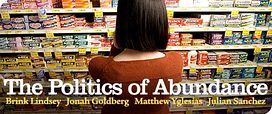Brink’s latest post makes a distinction I think is key, because the long term trend he’s describing is significantly more defensible than the thesis that there’s a “libertarian center” in contemporary politics; a claim that’s both distinct and more problematic. All words are greased hogs, and political words especially. Imagine trying to parse for a Martian linguist: “The conservatively dressed liberal heaped liberal scorn on the conservative liberal arts major’s argument for trade liberalization.” The aptness of a term, as that sentence illustrates, is a function of the job for which it’s being conscripted, and the greater the number of available uses, the more important it becomes to be clear about what work you’re expecting a term to do.
So when I quibble with the way Brink uses the term “libertarian,” it’s certainly not because I think we generally need to hew to some very rigorous formal criteria for what will count as a “libertarian” view or individual. I agree it’s best thought of as a looser “family resemblance” classification. My worry, rather, is that a use of the term that may be perfectly descriptively accurate (our approach to sexuality or economic regulation has become “more libertarian”) may be misleading for other purposes.
One concern I have is that even if Brink is substantively correct, the form of his argument will tend to yield evidence for a “libertarian center” under almost any political conditions. Duverger’s Law all but guarantees that, under our electoral system, political actors will cluster themselves into two main groups—liberals and conservatives, say—with the mainstream of each group positioned some distance from the median of voter opinion. (The simplest versions of the median voter theorem have them both at the median, but positioning off-center prevents spoiler entrants on either side.) At any given time, one or both will have an agenda that includes some forms of cultural or economic regulation. Neither will consistently get all they want—in part just as a function of the definitions of “agenda” (which excludes what’s already been achieved) and “poles” (off center). To be left or right is to be left or right of something, after all.
More succinctly put: Any time one pole of the political spectrum favors greater government control, it’s borderline tautological that the “center” will be more libertarian. Of course, the same holds (mutatis mutandis) for an “authoritarian center” thesis. That is not to say it’s vacuous to claim that median opinion is either “libertarian” or “authoritarian,” especially if we’re tracking changes over time, but it is certainly grounds for caution. If I’m awake enough after the third act of Gotterdammerung (mass plenitude apparently includes the ability to offer free public WiFi at Lincoln Center) I’ll offer some more qualified grounds for caution about the longer term trend as well.

